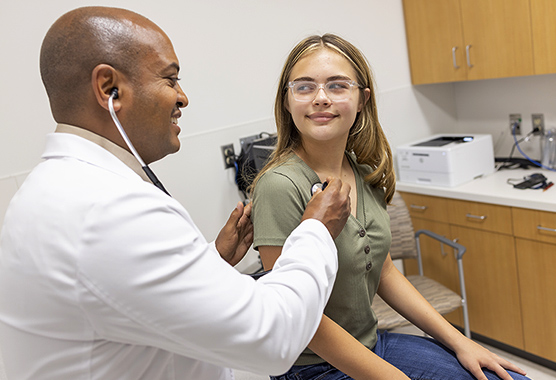Inherited Heart Conditions in Children
Certain types of heart conditions are genetic — meaning that children inherit them from their parents. Our pediatric cardiologists are experts at detecting and treating these conditions to keep your child healthy.
Medically reviewed by Jonathan Gil Dayan, M.D. on March 08, 2024.

Pediatric Heart Experts to Care for Inherited Heart Conditions
Early detection and treatment of inherited heart conditions is important. At the UC Davis Pediatric Heart Center, our cardiologists work with you and your child to find the right treatment.
We provide a range of advanced therapies — and the peace of mind that comes with knowing your child’s heart is in good hands.
What Are Inherited Heart Conditions?
Some heart conditions are related to your genes. A parent can pass down the condition to their child. In some cases, the parent may not even know that they have the condition.
Many inherited heart conditions have no symptoms, but some can be life-threatening.
We’re experts at helping children with inherited heart conditions, including:
- Arrhythmias: Irregular heart rhythms
- Cardiomyopathy: Diseases that can affect the heart muscle function or electrical conduction
- Congenital heart defects: Structural defects in the heart that develop before birth
- Familial hypercholesterolemia: A genetic cause of high cholesterol that can lead to heart attacks at a young age
- Heart problems related to genetic conditions: Certain inherited conditions — such as Marfan syndrome or Down syndrome — can affect your child’s heart function.
Symptoms of Inherited Heart Conditions in Children
In many cases, your child won’t experience any symptoms from an inherited heart condition. But there are some symptoms that various heart disorders have in common.
Common Symptoms
Talk to your pediatrician if you or your child notice any symptoms of a heart condition, including:
- Dizziness
- Fainting
- Fatigue
- Heart palpitations
Emergency Symptoms
In rare cases, some inherited heart conditions can lead to a sudden stop in heartbeat and breathing during physical activity. Seek medical help immediately if your child experiences:
- Chest pain
- Rapid breathing or shortness of breath, especially during physical activity
- Seizure
- Fainting
Causes
Most genetic heart conditions pass on through autosomal dominant inheritance. That means a child only needs one copy of the altered gene to inherit the condition. If one parent has a genetic heart condition, their child has a 50% chance of inheriting it.
Diagnosing Inherited Heart Conditions
If you are aware of any heart conditions that run in your family, talk to your child’s pediatrician. They can determine what tests to do and alert you of symptoms to watch out for.
If your child developed a heart condition before birth, your provider may detect it during a pregnancy ultrasound. For older children, your pediatrician may find a heart anomaly during a routine exam. Other tests we use to diagnose genetic heart conditions include:
- Bloodwork: A blood test can measure electrolytes and protein levels. It also tests for genetic markers.
- Echocardiogram: This test looks at the heart’s structure and function.
- Electrocardiogram (ECG): This test measures the heart’s electrical activity.
- MRI: This scan provides detailed images of the heart’s structure.
Treatments for Inherited Heart Conditions in Children
Treatment depends on the type of heart condition your child has inherited and also its severity. Some conditions may not require treatment. For example, certain heart defects in children get better on their own.
If your child does need treatment, the UC Davis Pediatric Heart Center offers exceptional care for infants, children and teens. Some inherited heart conditions may require long-term monitoring and care. Our pediatric heart experts are here to support you and your child throughout treatment.
Depending on their condition, your child may receive:
Medication
Various medications can help improve heart function, restore normal heart rhythms or lower cholesterol. In most cases, your child’s doctor will prescribe medication before recommending more invasive treatments.
Implantable Devices
Pacemakers or implantable defibrillators can help treat arrhythmias or cardiomyopathy.
Surgery
Our pediatric cardiovascular surgeons have the expertise necessary to perform complex heart surgeries in infants and children. After surgery, your child will spend time recovering in our pediatric and cardiac intensive care unit (PICU).
Who does it affect?
1 in 200People have an inherited heart condition
Source: European Journal of Human Genetics: Secondary findings in inherited heart conditions: a genotype-first feasibility study to assess phenotype, behavioural and psychosocial outcomes
Request an Appointment
As Sacramento's No. 1 hospital, you'll benefit from unique advantages in primary care and specialty care. This includes prevention, diagnosis and treatment options from experts in 150 specialties.
Referring Physicians
To refer a patient, submit an electronic referral form or call.
800-4-UCDAVIS
Patients
Call to make an appointment.
Consumer Resource Center
800-2-UCDAVIS

Ranked among the nation’s best hospitals
A U.S. News & World Report best hospital in cardiology, heart & vascular surgery, diabetes & endocrinology, ENT, geriatrics, neurology & neurosurgery, and pulmonology & lung surgery.

Ranked among the nation’s best children’s hospitals
U.S. News & World Report ranked UC Davis Children’s Hospital among the best in pediatric nephrology, orthopedics*, and pulmonology & lung surgery. (*Together with Shriners Children’s Northern California)

Ranked Sacramento’s #1 hospital
Ranked Sacramento’s #1 hospital by U.S. News, and high-performing in aortic valve surgery, back surgery (spinal fusion), COPD, colon cancer surgery, diabetes, gynecological cancer surgery, heart arrhythmia, heart failure, kidney failure, leukemia, lymphoma & myeloma, lung cancer surgery, pacemaker implantation, pneumonia, prostate cancer surgery, stroke, TAVR, cancer, orthopedics, gastroenterology & GI surgery, and urology.

The nation’s highest nursing honor
UC Davis Medical Center has received Magnet® recognition, the nation’s highest honor for nursing excellence.

World-class cancer care
One of ~59 U.S. cancer centers designated “comprehensive” by the National Cancer Institute.

A leader in health care equality
For the 13th consecutive year, UC Davis Medical Center has been recognized as an LGBTQ+ Healthcare Equality Leader by the educational arm of America’s largest civil rights organization.

